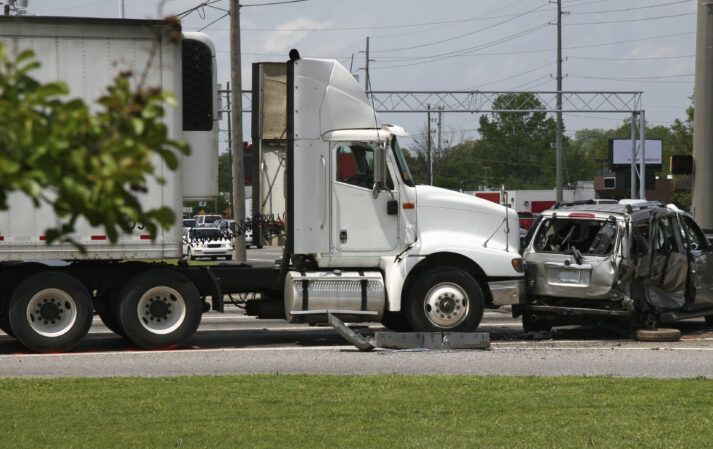reports1@rankings.io | October 9, 2025 | Uncategorized

In the wake of a fatal truck accident, the primary legal focus is on compensating a family for their loss. Sometimes, however, the story behind the crash reveals a level of recklessness that goes far beyond a simple mistake.
This is where the concept of punitive damages comes into play. These are not meant to cover your family’s losses; instead, they are a financial award ordered by a court to punish a trucking company for extreme misconduct and to send a clear message that such behavior will not be tolerated.
In Texas, these damages are reserved for cases where the evidence demonstrates the harm was caused by what the law calls “gross negligence,” “malice,” or “fraud.” It’s a legal concept that means the company’s conduct showed a conscious disregard for the safety of others. Proving this requires a higher standard of proof called “clear and convincing evidence.” Our work involves building a case designed to meet this high standard.
If you have questions about the circumstances of your loved one’s accident, call Stephens Law at (817) 420-7000.
Key Takeaways for Punitive Damages in Texas Truck Accident Cases
- Punitive damages are intended to punish extreme negligence, not to cover your family’s losses. This is a separate award from compensatory damages, which pay for financial and emotional costs.
- The legal standard in Texas is high. To qualify, we must show “clear and convincing evidence” that the trucking company acted with “gross negligence”—meaning they knew of a severe danger and ignored it.
- Evidence is found in company records, not the police report. Proving gross negligence requires a deep investigation into internal documents like driver logs, maintenance records, and hiring files.
What Is the Difference Between Compensatory and Punitive Damages?

It’s easy to believe that all financial recovery is the same, but the law divides it into two very different categories.
Here is a simple breakdown:
Compensatory Damages: Making You “Whole”
They are intended to pay for the actual, measurable losses your family has suffered because of the accident. They fall into two subcategories:
- Economic Damages: These cover the tangible costs that come with clear dollar amounts. This includes final medical bills, funeral and burial expenses, the lost lifetime income your loved one would have provided, and the value of lost household services.
- Non-Economic Damages: These address the personal losses that don’t have a price tag. This includes your family’s mental anguish, the loss of companionship and guidance, and the emotional pain and suffering that rewrites every aspect of life.
Punitive Damages: Punishing and Preventing
These are entirely different. Punitive damages are not tied to a specific loss your family suffered. Their purpose is to penalize the defendant (the trucking company or another responsible party) for behavior that shows a conscious indifference to the safety of others. It is a tool the justice system uses to deter that company and others from making the same dangerous choices in the future.
Does Your Case Qualify? The Texas Standard for Punitive Damages
Securing punitive damages in a fatal truck accident case is a difficult task because the legal bar is set very high. In Texas, a family must work with an experienced truck accident lawyer to
prove by “clear and convincing evidence” that the harm they suffered resulted from fraud, malice, or gross negligence on the part of the defendant.
What Does “Clear and Convincing Evidence” Mean?
Most civil cases, including the compensatory damages part of a claim, are decided based on a “preponderance of the evidence.” This standard simply means that it is “more likely than not” that the defendant is responsible.
“Clear and convincing evidence” is a much tougher standard to meet. It means the proof presented must be strong enough to produce a firm belief or conviction that the allegations are true. The evidence cannot leave any serious or substantial doubt.
Breaking Down the Legal Terms
To secure punitive damages, we must show the defendant’s conduct met one of these three legal definitions:
- Malice: This involves proving a specific intent by the defendant to cause substantial injury or harm to your loved one. While less common in trucking cases, it might apply in a rare road rage incident where a truck driver intentionally used their vehicle as a weapon.
- Fraud: This refers to an act of intentional deception. For example, if a trucking company was found to have systematically falsified its maintenance records to hide dangerous mechanical problems from inspectors, that would be considered fraud.
- Gross Negligence: This is the most common path to punitive damages in fatal truck accident cases. The legal definition states it is an act or omission: “…which involves an extreme degree of risk, considering the probability and magnitude of the potential harm to others; and of which the actor has actual, subjective awareness of the risk involved, but nevertheless proceeds with conscious indifference to the rights, safety, or welfare of others.”
In plain language, proving gross negligence means establishing two facts:
- The trucking company knew about a severe danger.
- They chose to ignore it and do nothing about it.
What Does Gross Negligence Actually Look Like in a Trucking Case?
Gross negligence doesn’t typically present from a single, isolated mistake. It is almost always revealed as a pattern of decisions where a company prioritizes schedules and profits over the safety of the public.
The evidence of this is rarely on the surface. It requires a deep investigation to uncover policies and behaviors that, when connected, show a conscious disregard for human life. Here are some concrete examples of conduct that might rise to this level:
Systemic Disregard for Hours-of-Service Rules
Federal law places strict limits on how long a truck driver is behind the wheel without taking a mandatory rest break. These hours-of-service regulations exist because tired driving is incredibly dangerous. According to the Federal Motor Carrier Safety Administration’s landmark Large Truck Crash Causation Study, driver fatigue was a factor in 13% of crashes involving commercial drivers. An example of gross negligence would be a company that consistently pressures its drivers to falsify their electronic logs to meet unrealistic delivery deadlines, all while knowing the deadly risks of driver fatigue.
Negligent Hiring and Retention
A trucking company has a duty to ensure its drivers are safe and qualified. Gross negligence occurs when a company hires a driver with a known history of DUIs, reckless driving convictions, or other serious safety violations.
Similarly, keeping a driver employed after they have caused multiple preventable accidents could also demonstrate a conscious disregard for safety. Texas law sets clear standards for commercial driver licensing and disqualifications that companies must follow.
Failure to Properly Maintain Vehicles
An 80,000-pound commercial truck has hundreds of parts, and a failure in any one of them is catastrophic. If a company develops a pattern of skipping federally mandated inspections or ignoring necessary repairs on brakes, tires, or steering systems simply to save money, it is knowingly putting a dangerous vehicle on the road. When that deferred maintenance leads to a fatal mechanical failure, it is a clear example of gross negligence.
Other Potential Examples
- Ignoring a Driver’s Known Medical Issues: Allowing a driver to operate a commercial vehicle despite knowing they have a medical condition, like a seizure disorder, that could cause them to lose consciousness.
- Lack of Proper Training or Supervision: Failing to train drivers on how to handle hazardous materials or properly secure oversized loads, resulting in a fatal spill or collision.
How We Build a Case for Punitive Damages

The evidence of gross negligence is almost never found in the initial police report; it is buried in company documents and data. Our role is to systematically uncover it. This is how we approach the process:
Securing Immediate Evidence
The first step is to act quickly. We immediately send legal notices known as preservation letters to the trucking company. These letters demand that they do not alter, repair, or destroy key evidence, including the truck’s electronic data recorder (“black box”), the driver’s communication records, and the vehicle itself.
Analyzing Electronic Logging Devices (ELDs)
The federal ELD mandate requires commercial trucks to have electronic logs that automatically track driving hours. We obtain this raw data and have it analyzed by specialists who identify signs of tampering, manipulation, or consistent violations of hours-of-service regulations that point to a company-wide problem.
Examining Company Records
Through the legal discovery process, we file formal requests for internal documents that reveal a pattern of negligence. This is a treasure trove of evidence, including:
- Hiring and Driver Qualification Files: To determine if the company followed the law when vetting its driver or if they hired someone they knew was unqualified.
- Maintenance and Repair Logs: To find proof of skipped inspections, recurring safety issues that were ignored, or a history of shoddy repairs.
- Post-Accident Drug and Alcohol Test Results: Which are required after any fatal commercial vehicle accident.
- Internal Communications: This includes emails and dispatch records that may show a dispatcher pressuring a driver to violate safety rules or keep driving despite being dangerously tired.
Conducting Depositions and Working with Industry Insiders
We question company managers, safety directors, and dispatchers under oath to get a clear picture of their official policies and daily procedures. We also frequently consult with former trucking industry executives and safety experts. These professionals help establish what a reasonably safe trucking company should have done and how the defendant’s actions fell far short of that standard.
Are There Limits on Punitive Damages in Texas?
Yes, Texas law does place limits, often called “caps,” on the amount of punitive damages awarded in most cases.
Under the Texas Civil Practice and Remedies Code, punitive damages are generally capped at the greater of either:
- Two times the amount of economic damages, plus an amount equal to any non-economic damages found by the jury (with the non-economic portion of this calculation not to exceed $750,000); or
- $200,000.
Frequently Asked Questions About Fatal Truck Accident Claims
how long do we have to file a wrongful death lawsuit in texas?
In Texas, the statute of limitations for filing a wrongful death claim is generally two years from the date of the person’s death. Because these investigations are complicated, always begin the process well before this deadline expires.
can we still seek punitive damages if the truck driver was an “independent contractor?”
Yes, in some cases. Trucking companies sometimes classify their drivers as independent contractors to try to avoid liability. However, the company may still be held directly responsible if it was negligent in hiring the contractor, entrusting the job to them, or if it retained significant control over their work.
will our case go to trial if we seek punitive damages?
A claim for punitive damages raises the financial stakes for the trucking company and its insurer, which makes reaching a fair truck accident settlement more difficult. While the majority of cases are resolved before trial, we prepare every case from day one as if it will be presented to a jury.
A Punitive Damages Claim Holds Negligent Companies Accountable

When a trucking company’s conscious choices lead to a devastating and preventable loss, your family deserves answers and demands accountability. A claim for punitive damages is a powerful tool to achieve that. It sends a clear message that putting profits ahead of people’s safety is unacceptable on Texas roads and has severe consequences.
You do not have to walk this path alone. Our role at Stephens Law is to manage the legal process, uncover the necessary evidence, and build the strongest case possible so you focus on what matters most—your family.
Let us help you take the next step. Call Stephens Law today at (817) 420-7000 for a confidential conversation about your case.
